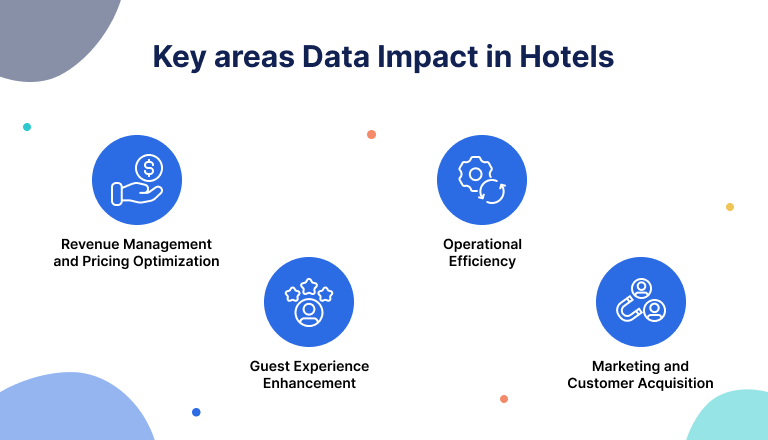The hotel industry has a lot of valuable data in today’s digital age. This data includes guest preferences, booking patterns, revenue figures, and operational metrics.
Data analytics is a game-changing tool for hotels. It helps them make decisions, improve guest experiences, and optimize operations.
In the past, hoteliers relied on experience and intuition. But now, analyzing large amounts of data provides valuable insights that can make a big difference.
Gathering guest feedback through comment cards is no longer enough. Modern hotels generate data at every touchpoint, from online searches to checkout and beyond.
Using data analytics, hotels can find hidden patterns, predict market trends, personalize guest experiences, and make informed decisions that impact their bottom line.
Whether you own a boutique hotel or manage a large chain, understanding and using data analytics is not just an advantage, but a necessity in the changing hospitality landscape.
Understanding the Fundamentals of Hotel Data Analytics
Hotel data analytics involves collecting, processing, and analyzing data to make informed decisions. The process starts with identifying key data sources, such as property Management Systems (PMS)
- Online booking platforms
- Customer feedback systems
- Point of Sale (POS) systems
- Social media interactions
- Website analytics

Key Areas Where Data Analytics Makes an Impact
Revenue Management and Pricing Optimization
Data analytics is transforming how hotels develop their pricing strategies.
By examining historical booking data, competitor rates, and market demand, hotels can adopt dynamic pricing models to maximize revenue. Key elements include:
- Forecasting peak seasons and adjusting rates to capitalize on high demand.
- Identifying booking patterns to efficiently manage and optimize room inventory.
- Understanding price sensitivity across various customer segments to set competitive rates.
- Analyzing local events’ impact on demand to tailor pricing strategies effectively.
See how you can improve pricing strategy of your hotel.
Guest Experience Enhancement
Understanding guest preferences and behavior patterns is key to delivering personalized experiences:
- Analyzing guest history to predict needs and tailor services.
- Tracking feedback trends to pinpoint areas for improvement.
- Monitoring social media sentiment to measure guest satisfaction.
- Designing targeted marketing campaigns based on detailed guest profiles.
See how increasing guest experience directly increase revenue.
Operational Efficiency
Data analytics streamlines hotel operations by enabling:
- Optimized staff scheduling based on occupancy trends.
- Efficient inventory management for housekeeping and food & beverage departments.
- Analysis and optimization of energy consumption to reduce costs.
- Predictive maintenance to prevent operational disruptions.
- Strategic resource allocation during peak periods.
Marketing and Customer Acquisition
Smart data analysis enables more effective marketing:
- Identifying the most profitable customer segments
- Understanding booking channels that drive the most revenue
- Analyzing the effectiveness of marketing campaigns
- Creating targeted promotions based on customer behavior
Implementing Data Analytics in Your Hotel
Step 1: Define Clear Objectives
Start by identifying what you want to achieve:
- Increased revenue
- Improved guest satisfaction
- Reduced operational costs
- Enhanced marketing ROI
Step 2: Choose the Right Tools
Select appropriate analytics tools based on your needs:
- Business intelligence platforms
- Revenue management systems
- Customer relationship management (CRM) software
- Predictive analytics tools
Step 3: Data Collection and Integration
Ensure proper data collection from all sources:
- Implement systems to gather data consistently
- Integrate different data sources
- Ensure data quality and accuracy
- Maintain data security and privacy
Step 4: Analysis and Action
Turn data into actionable insights:
- Regular reporting and monitoring
- Real-time analytics for immediate decision-making
- Predictive analysis for future planning
- Performance tracking against KPIs
Best Practices for Success
- Start Small: Begin with one area of focus and expand gradually
- Ensure Data Quality: Maintain clean, accurate, and consistent data
- Train Staff: Invest in training to build a data-driven culture
- Regular Review: Continuously monitor and adjust strategies based on insights
- Stay Compliant: Adhere to data privacy regulations and protect guest information
Measuring Success
Track key metrics to evaluate the effectiveness of your data analytics implementation:
- Revenue growth
- Guest satisfaction scores
- Operational cost reduction
- Marketing campaign ROI
- Staff productivity improvements
Future Trends in Hotel Data Analytics
Stay ahead by keeping an eye on emerging trends:
- Artificial Intelligence and Machine Learning Integration
- Predictive analytics for personalized guest experiences
- IoT devices for real-time data collection
- Blockchain for secure data management
- Advanced visualization tools for better decision-making
Conclusion
Data analytics in the hotel industry has become essential for staying competitive.
By adopting data-driven strategies, hotels can enhance decision-making, elevate guest experiences, and streamline operations.
Success lies in setting clear objectives, selecting the right tools, and consistently applying insights.
As technology advances, mastering data analytics will be the key to thriving in the dynamic hospitality landscape.
Get in Touch
Want to take your hotel business to the next level ? QloApps is here to help you create an exceptional guest experience while streamlining your operations.
With QloApps, you can manage bookings, inventory, and pricing efficiently all while offering unique amenities like wellness rooms that cater to today’s health-conscious travelers.
Let’s work together to make your hotel a top choice for guests seeking comfort, wellness, and a memorable stay.
Reach out today!

Be the first to comment.